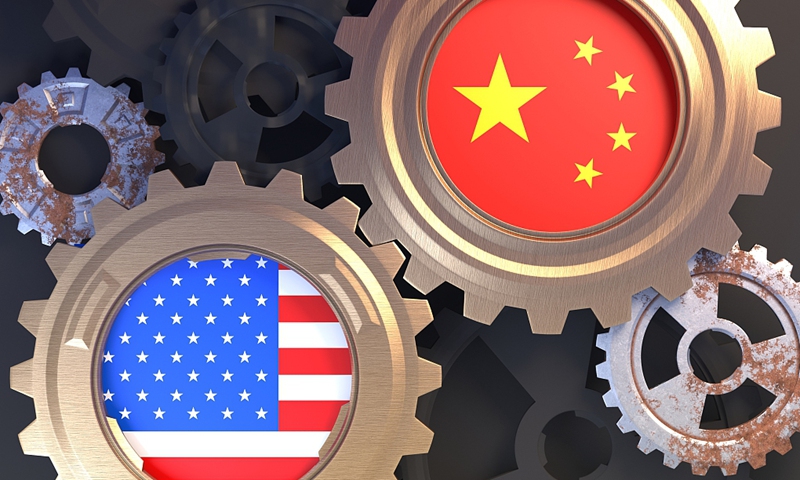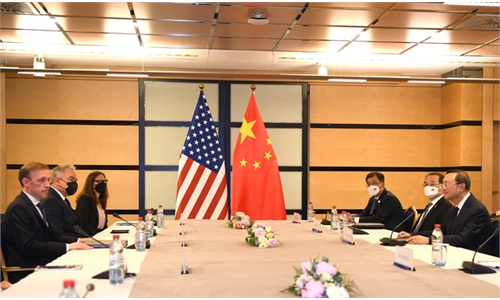
China-US
Yang Jiechi, a member of the Political Bureau of the Communist Party of China (CPC) Central Committee and director of the Office of the Foreign Affairs Commission of the CPC Central Committee, met with US National Security Advisor Jake Sullivan in Luxembourg on Monday. The two sides agreed to follow the important consensus reached by the two heads of state, step up contact and dialogue, reduce misunderstanding and miscalculation, and properly manage differences. The talks, which lasted four-and-a-half hours, included "candid, substantive, and productive" discussion of a number of issues, according to the White House.Obviously, the high-level dialogue between China and the US is becoming more and more intensive, which may indicate a "window period" for a phase of détente in China-US relations. The conversations between Yang and Sullivan show that both sides are willing to inject an element of "stability and certainty" into the China-US relationship. Both countries face very important domestic political agendas this year, as the CPC will convene its 20th National Congress in Beijing, and the US midterm congressional elections will be held in November when US President Joe Biden and the Democratic Party will mark its "mid-semester" in office.
Needless to say, Biden is under increasing pressure. Recently, under the influence of high domestic inflation, a falling stock market, recurring epidemic and frequent shootings, Biden's public approval rating has fallen to about 36 percent, a new low since taking office.
Undoubtedly, promoting stability in China-US relations with high-level dialogue, especially better control of China-US economic and trade relations, is crucial for the Biden administration to deal with domestic pressures. US inflation has recently hit a 40-year high of 8.6 percent. There are calls in the US for the Biden administration to remove punitive tariffs on Chinese exports as soon as possible to reduce inflationary pressures and ease the burden of inflation on average Americans. This shows again that the US will find it more challenging to solve the problems at home if it insists on increasing its containment of China.
The US also needs China's diplomatic support. International and regional issues, such as the Ukraine crisis and the Korean Peninsula nuclear issue, were discussed in the recent meeting between Yang and Sullivan. As the military conflict between Russia and Ukraine drags on, countering Russia is becoming an increasingly heavy "strategic burden" for Washington. At the same time, aid to Ukraine costing tens of billions of dollars has clearly increased the fiscal pressure on the US.
In addition, the Biden administration fears North Korea will launch a new round of nuclear weapons and ballistic missile tests. If there are "major geopolitical problems" in Europe and Asia, Biden's report card on foreign policy will definitely look grim.
Moreover, the Taiwan question drives the intensive dialogue between Chinese and US top-level officials. In recent years, this question has become the focus of the game between the two great powers after Washington enhanced its strategic competition with Beijing. The US has been recklessly implementing the strategy of "using Taiwan to contain the Chinese mainland" and hyping groundless accusations, including "the mainland will attack the island of Taiwan before 2027."
Yang told Sullivan in all seriousness that the Taiwan question concerns the political foundation of China-US relations, and if it is not handled properly, will have a subversive impact.
Chinese Defense Minister Wei Fenghe, who recently attended the 19th Shangri-La Dialogue in Singapore, also sent a stern warning to Washington that the Chinese military will resolutely counter any attempt for "Taiwan independence." To some extent, this proves the competition between China and the US over the Taiwan question is intensifying.
Amid the Russia-Ukraine conflict, some US politicians have clamored to "protect Taiwan by force" and declare "strategic clarity." They try to step over the redline - the one-China principle, which sends a wrong signal to Taiwan secessionists. Apart from that, Washington has strengthened its cooperation with its allies, including Japan and Australia, in an attempt to exert coordinated pressure on China over the Taiwan question.
As Yang stated, China-US relations are at a critical crossroads and the three principles - mutual respect, peaceful coexistence, and win-win cooperation - are the correct approaches for China and the US when it comes to getting along with each other. US President Joe Biden repeatedly told Chinese President Xi Jinping that the US does not seek a new Cold War with China; it does not aim to change China's system; the revitalization of its alliances is not targeted at China; the US does not support "Taiwan independence"; and it has no intention to seek a conflict with China.
In order to bring China-US relations back on the right track of stable development, the US side should correct its strategic understanding of China, translate words into actions. This is not only in line with the fundamental interests of both the Chinese and American peoples, but also conforms to the general aspirations of the international community. It is also beneficial to China, the US, and the world.
The author is a senior research fellow at the Charhar Institute and an adjunct fellow at the Chongyang Institute for Financial Studies at Renmin University of China. opinion@globaltimes.com.cn

